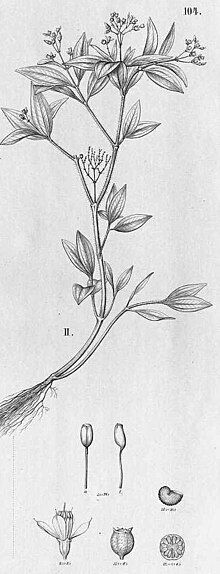Aciotis paludosa
| Aciotis paludosa | |
|---|---|

| |
| (image II - Aciotis Martiana) [1] | |
| Scientific classification | |
| Kingdom: | Plantae |
| Clade: | Tracheophytes |
| Clade: | Angiosperms |
| Clade: | Eudicots |
| Clade: | Rosids |
| Order: | Myrtales |
| Family: | Melastomataceae |
| Genus: | Aciotis |
| Species: | A. paludosa
|
| Binomial name | |
| Aciotis paludosa | |
| Synonyms[2] | |
| |
Aciotis paludosa is a plant species in the Melastomataceae family, native to Colombia, Venezuela, Brazil, and Peru.[2]
The species was first described as Spennera paludosa in 1828 by Carl von Martius,[2][3] and was given its current name in 1872 by José Jerónimo Triana who transferred it to his new genus of Aciotis.[2][4]
It is found in the wet tropical biome.[2]
Description
[edit]Carl Friedrich Philipp von Martius describes it as having:
caule basi radicante angulato hirsuto molliter et rufo hirsutissimo, pube hinde bifarium disposita, foliis breve petiolatis ovatis aentis ciliato-serratis 3-5 nerviis sparse pilosis, cyma subpaniculata abbreviata (??) in sabulosis humidis Brasiliae circa Rio Janeiro.[3]
Etymology
[edit]The species epithet, paludosa, implies that it is found in boggy places.[5]
References
[edit]- ^ "ACIOTIS I. dichotoma. II Martiana". plantillustrations.org.
- ^ a b c d e "Aciotis paludosa". Plants of the World Online. Royal Botanic Gardens, Kew. Retrieved 10 December 2024.
- ^ a b Aug. Pyramo de Candolle (1828). "Spennera". Prodromus Systematis Naturalis Regni Vegetabilis. 3: 115.
- ^ Triana,J.J. (1872). "Aciotis". Trans. Linn. Soc. London. 28: 51.
- ^ "paludosus, -a, -um". plantillustrations.org. Retrieved 10 December 2024.
External links
[edit]
